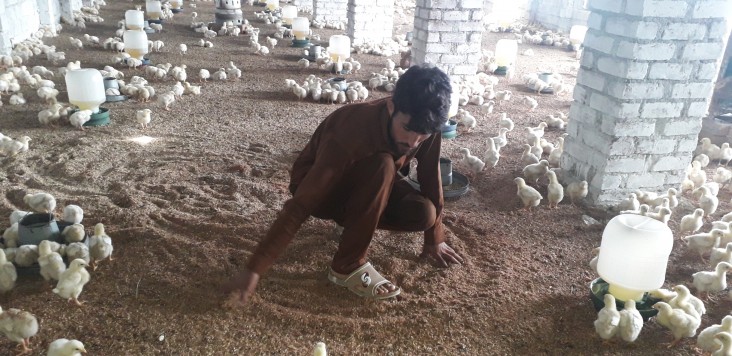Speeches Shim

Hamid Mangal is a young poultry farmer from Mango Village in eastern Afghanistan. Right after he graduated from the Tech-nical and Vocational Institute of Laghman in 2014, he set up a chicken farm with a first flock of 2,000 chicks. Things did not go well. Within three days, 300 chicks died. Worse, the surviving chicks got sick, and Hamid spent a significant amount on veter-inary services. In the end, he lost almost $1,300.
He thought about quitting the poultry business, but a neighbor told him that the sawdust Hamid had used as litter, obtained from a carpentry shop, carried disease and was too rough for the tender chicks. The neighbor recommended buying litter from Hilal Poultry Farming and Service Center (HPFSC), a local poultry supplier that had received sawdust processing equipment under a USAID/RADP-East grant.
Like Hamid, many poultry producers in Afghanistan lack tech-nical knowledge and access to quality materials. For young flocks, rough, contaminated litter means high mortality rates and subsequent loss of farmer income. RADP-East has been addressing that problem through grants to suppliers such as HPFCS. With the support of RADP-East, the company’s sales increased by 152 percent in one month and HPFCS hired two full-time employees to respond to increasing demand from farmers.
Hamid decided to give it a try. He went to HPFSC to buy saw-dust and was gratified to also free advice from the company’s poultry experts. He followed the advice and lost fewer than 50 chicks from his second flock of 2,000 over the full breeding cy-cle of 45 days. He also made a $1,000 profit.
“I’ve seen the difference high quality litter makes for the flock. I am presently in my fourth batch of chicks, and each brood grows on HPFSC sawdust. Not only that I can support my family now, but I also hired a farm laborer, and I enrolled in a higher education program at a private university to become a better farm manager,” said Hamid.
RADP-East, a $28 million, five-year USAID-funded program, manages 34 active agricultural grants with a total value of nearly $2 million across five provinces of Afghanistan.

Comment
Make a general inquiry or suggest an improvement.